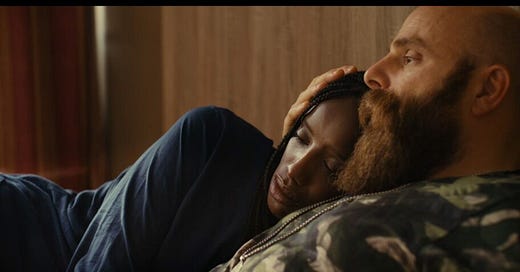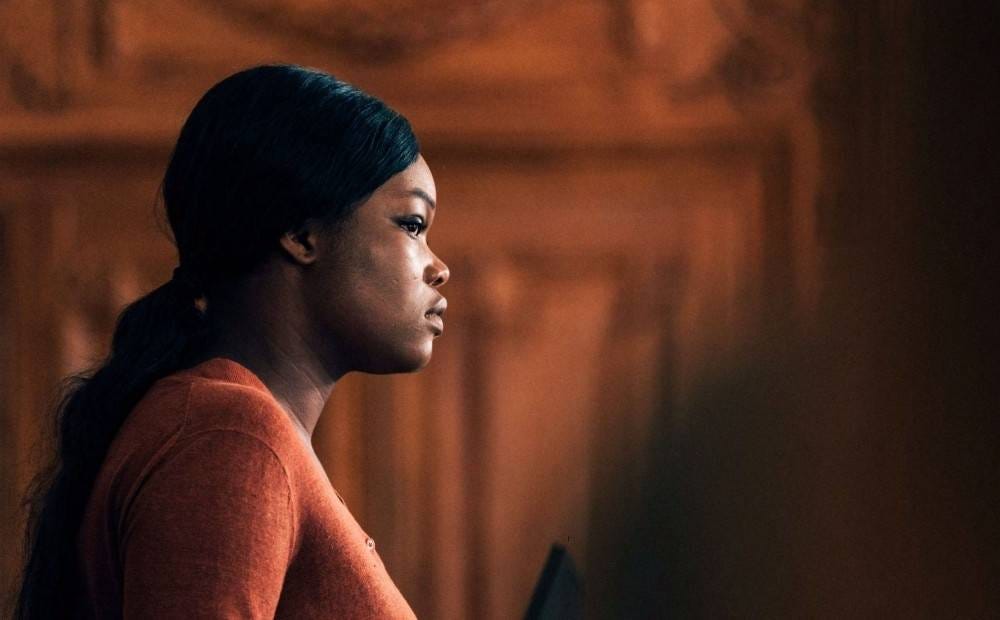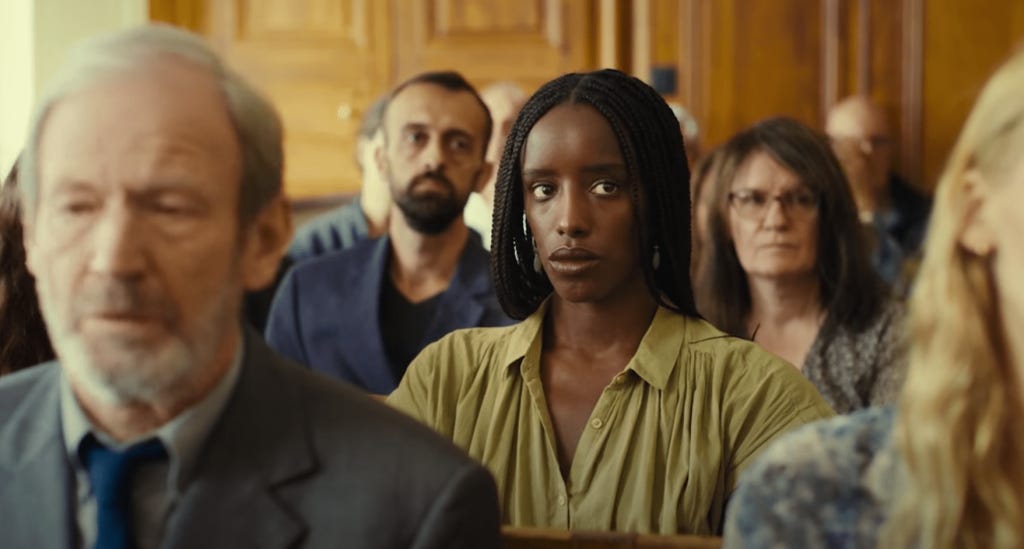Saint Omer - review
A very, very sad film about motherhood and loneliness. But don't let that stop you from seeing it!
Saint Omer, d. Alice Diop, 2022.
Seen at Cinecentre Amsterdam.
MILD SPOILERS BELOW! BUT IT WON’T RUIN THE FILM!
I was very, very excited to see Saint Omer, which is usually a recipe for disaster when things don’t live up to the hype. The good news is that I did absolutely love it.
There’s just something about courtroom dramas. As a simple gal with simple needs, I want to hear the whole story, in chronological order, in painstaking detail. I do not like to think for myself. That is why I have gone to see a film rather than staying in and staring at the wall. This is why I have no idea what Aftersun was actually about.
Saint Omer is based on a true story of infanticide that happened in Normandy a decade ago. But that’s not where the story begins. We meet Rama, a young French university lecturer and writer of African descent, who lives in Paris with her white partner, the bearded and wonderfully friendly Adrien. She is the youngest of three daughters, and their father died some time ago. Her elderly mother is broken and silent years after the death of her husband, and her relationship with Rama is strained. A dinner with Rama, her family, and Adrien is friendly but a little awkward. Her sisters are kind to her, but she doesn’t seem to be able to accept it; she is closed off, seemingly disconnected from her family.
Rama travels to Saint Omer, close to Calais. She is there to attend the trial of Laurence Coly, who is accused of the murder of her young daughter, Elise. Laurence, a postgraduate philosophy student originally from Dakar, left Elise on the beach at Berck-sur-Mer and waited for the tide to take her away. The story is based on the true case of Fabienne Kabou and her daughter Adelaide. Laurence is based directly on Fabienne - they are both Senegalese, study Wittgenstein, and left their daughters on the same beach. It is not the only parallel - Rama sees a lot of herself in Laurence, relating to her difficult relationship with her mother and reflecting on her own future motherhood. These similarities torment her, as she gets too deeply drawn into the trial. Rama, in turn, is based on Alice Diop herself, who attended the trial of Fabienne Kabou whilst pregnant. The line between fantasy and reality, both within the film and beyond it, is fuzzy.
At the stand, Laurence calmly answers questions about her youth, her move to France, and her pregnancy, which she kept a secret from everyone but the baby’s father. The man in question is Luc, a white Frenchman several decades her senior. He comes across as rather a pathetic character, old fashioned in his views and unable to figure out his relationship with his Black partner, who he never bothers to introduce or even mention to his family. They live together in secret, struggling to understand one another. Their testimonies are fascinatingly juxtaposed, with one telling their side of the story persuasively, only to find the other offering an equally persuasive rebuttal. As the viewer, we find ourselves struggling with who to believe, or whether to pick and choose the bits we find the most convincing. We never really find out the real story. But that’s not really the point.
Laurence’s self imposed invisibility is an interesting aspect of the film that doesn’t become obvious until the prosecutor’s closing words at the end of the trial. Once a promising philosophy student, she begins to miss her classes at the faculty, eventually stopping altogether. She loses touch with her cousin in Paris, and has few friends. She is Luc’s invisible partner, unknown to his “first” family - his ex-wife, with whom he dines with once a week, and his adult daughter of around Laurence’s age, who becomes pregnant at the same time as Laurence. When Elise is conceived, Laurence never visits the doctor for scans or checkups. She doesn’t leave the house when visibly pregnant. She goes into labour while Luc is away visiting his dying brother. She gives birth alone, and doesn’t tell Luc; he finds out when he returns. Though Luc takes Elise out the house, Laurence never does. Elise’s birth is never registered.
Laurence struggles with motherhood, describing the year before Elise’s death as the worst of her life. She claims to have sought the advice of witch doctors, claiming that there was no doubt that this funk she was in was due to sorcery. We begin to put the pieces together in Laurence’s narrative, as we realise that this educated and poised woman, raised speaking on French in Dakar by her appearances obsessed mother, was looking for solutions to her deteriorating mental state in the only way she was comfortable doing.
A sympathetic view, by whatever twisted logic her damaged mind led her to believe, is that Laurence’s identified Elise’s conception and birth as the root of her problems. Getting Elise out the way may have seemed like the only solution. But the prosecutor suggests a more sobering explanation. Elise did not technically - legally - exist. She was never seen with her mother. There was no record of her birth, or Laurence’s pregnancy. Her argues that Laurence thought that after being left on the beach, Elise would be swept out to sea and disappear into the waves. No one would ever find out. It was the perfect crime, and Laurence wouldn’t have turned herself in had Elise’s body not washed up on the beach and the police hadn’t come knocking. She thought she would get away with it. It is a convincing argument. It doesn’t really explain the why, but perhaps explains some of the how.
I don’t have much skin in the game when it comes to the subject matter. I am neither Black nor French, I’m not a mother or a lawyer, and my mother died when I was so young I can’t claim to have had any sort of developed and nuanced relationship with her. I also don’t want to become a mother, so films about motherhood seem a little dull. But Saint Omer manages to capture a far more fascinating and nuanced aspect of motherhood. In an interview with Deadline, Alice Diop explains that the films doesn’t seek the answer the question of “what is a mother” - rather, the daisy chain of mothers to mothers, and daughters to daughters, is more poignant. As I have no authority to discuss Blackness, Frenchness, motherhood, or daughterhood, I must quote Diop here:
How do you become a mother based on the mother that you have? Black women inherit these histories of violence and of silence. It’s a particular flavor that I think is political. I wanted to examine how do you love your children authentically, how does your past history effect that love, and how do you repair yourself within that?
What we share with our mothers and our daughters seems to be the thread that weaves through this story. In her closing remarks to the jewellery, Laurence’s defence counsel makes an impassioned speech. She explains that, while it is common knowledge that the mother’s cells and DNA transfer to her baby in utero, it also happens the other way around. Cells from the foetus move into and remain in the mother’s body, even after birth, and even if the baby does not make it to term. These cells can stay in their mother’s body forever, a part of her, forever. Fetomaternal microchimerism, to give it its proper name, is therefore present in all of us. But for mother (or those who give birth) specifically, they carry their children around with them forever. "It’s a never ending chain”, says the counsel. “In a way, us women, we are all monsters”, referring to the mythical chimera after which this phenomenon is named. Her intention is to present Laurence as a deeply unwell human, worthy of the jury’s sympathy. But perhaps it is also to show that Laurence will never be truly rid of Elise, even though she is no longer her. No amount of sea current could ever change that.
The film does not really have a conclusion. Perhaps Rama improves her relationship with her mother as her own impending motherhood approaches. Perhaps the jury spares Laurence from a life sentence and understands her struggle within the context of her crime. The raw loneliness portrayed throughout, one hopes, is rectified by its characters. What this film does expertly is grab our attention and encourage us to listen intently - both to what is being said, and to ourselves. Having listened to the whole trial of Fabienne Kabou herself, Alice Diop perhaps wants to give us the same experience. In an interview with Variety, Diop said:
I wanted to recreate my experience of listening to another woman’s story while interrogating myself, facing my own difficult truths. The narrative had to trace a series of emotional states that can lead to catharsis. It’s like accelerated psychotherapy.
I’ve left my favourite bit to the end so I didn’t have to bum you all out with discussions on loneliness and infanticide. I’d like to take a moment to talk about the judge presiding over the trial, played by Valerie Dreville. She remains balanced and fair throughout, and appears deeply moved by the final speech of the defence counsel. She sits in her red gown, with no wedding ring and her hair long and greying at the roots. She is smart and professional, stylish yet not glamorous. She is clearly extremely educated, but still sympathetic to this deeply messed up woman in front of her. It would have been extremely easy to write the character of a female judge taking on a case about motherhood as someone who could be emotionally appealed to “as a mother” or “family oriented”. I was very relieved to see that the writing didn’t go that way. Even the vicious prosecutor, punching holes in Laurence’s narrative, knows he cannot sink that low with her.
Conclusions? I came away deeply moved, but not necessarily to sadness. I was more moved to fascination and contemplating the complexity of Laurence’s case, and the ways in which justice could be sought for all those involved. Rama’s commitment to seeing the whole trial through, even when it was beginning to affect her too much, is admirable. I can imagine the same happened with Diop herself, which is why she was moved enough to make a whole film about it. Despite the courtroom setting and the slow pace, I found the whole film tremendously exciting and now all I want to do is watch more courtroom dramas.








